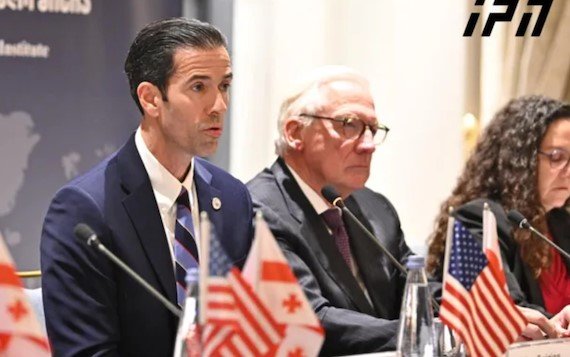Daniel Twining, President of the International Republican Institute (IRI), has issued a stark warning on the potential consequences of Georgia’s flawed parliamentary elections, following a statement from US Senator Roger Wicker. Twining’s comments reflect growing international concern about the integrity of Georgia’s electoral process and its impact on the country’s journey toward European Union (EU) membership—a goal that an overwhelming majority of Georgians support.
Concerns Over Georgia’s EU Future
With roughly 90% of Georgians reportedly in favor of EU integration, the recent elections have cast a shadow over the nation’s aspirations. Senator Roger Wicker’s statement two days ago called the elections a “farce,” pointing out a lack of transparency and legality. Wicker’s criticism echoed that of Georgian President Salome Zurabishvili, who has also raised concerns about the elections’ fairness and their reflection of the people’s will.
Twining backed Wicker’s strong language, noting that such an influential senator’s condemnation could draw increased scrutiny from the international community. He emphasized that if Georgian leaders ignore these signals, the consequences could be severe, potentially sidelining Georgia from its EU trajectory. For a country that has long sought alignment with Western values and governance, Twining’s message serves as a serious caution.

Senator Wicker’s “Farce” Comment Resonates Internationally
Senator Wicker did not mince words. His description of Georgia’s recent elections as a “farce” has sparked international attention, further casting doubt on the validity of the results. His stance aligns with that of President Zurabishvili, who has consistently pushed for transparent governance. Together, their critiques carry significant weight, reinforcing concerns that Georgia’s electoral process lacks the accountability and transparency required for genuine democracy.
Twining echoed these sentiments, describing Wicker’s words as “strong words from a strong senator.” He expressed hope that Georgia’s government would take notice of these international voices before it’s too late. Twining’s remarks reflect a broader sentiment among EU supporters: Georgia cannot afford to take risks with its EU aspirations, especially when trust in democratic processes is at stake.
Georgian Public Opinion: EU Membership at the Forefront
Georgia’s commitment to European integration has been a prominent aspect of its public agenda. Surveys indicate that around 90% of the Georgian population supports EU membership, seeing it as a path to stability, prosperity, and alignment with democratic values. This popular support has driven politicians to emphasize EU membership as a national priority. However, the recent elections may threaten this commitment if international partners question the legitimacy of Georgia’s democratic institutions.
Twining’s comments underscore the stakes for Georgian authorities. They face a delicate balancing act: responding to domestic pressures while assuring the international community of their commitment to democratic norms. For many Georgians, EU membership is more than a political objective—it represents a promise of a better future, linked to enhanced rights, economic growth, and closer ties with Europe.
The Role of International Pressure
Twining’s and Wicker’s statements exemplify the type of international scrutiny Georgia could increasingly face if doubts about its democratic processes persist. Countries vying for EU membership are typically required to adhere to stringent standards of transparency, legality, and fairness in governance. In this context, Georgia’s recent elections have raised concerns that may delay or even halt its progress toward integration.
EU membership for Georgia is not just a matter of signing treaties and agreements; it requires ongoing commitment to the core principles that define the EU. As such, Georgia’s response to international criticism of its electoral process could play a decisive role in shaping its EU future. With the IRI, the US, and influential European partners watching, Georgian authorities may need to consider reforms to safeguard the nation’s democratic reputation.
